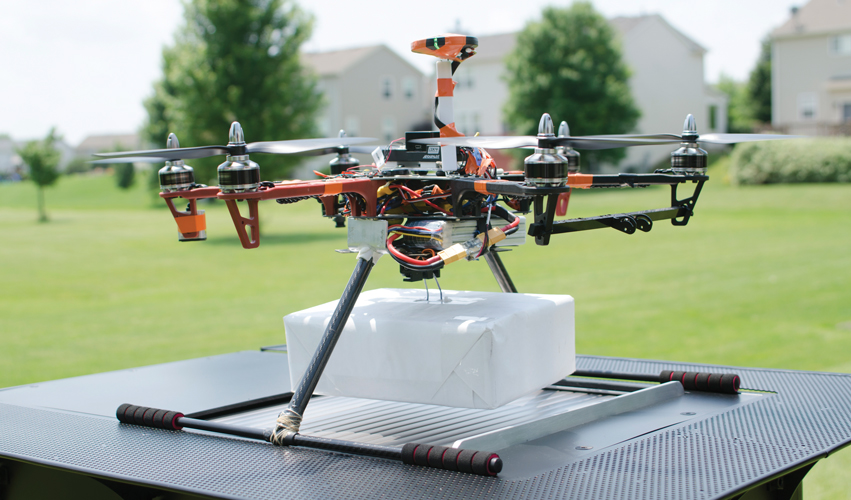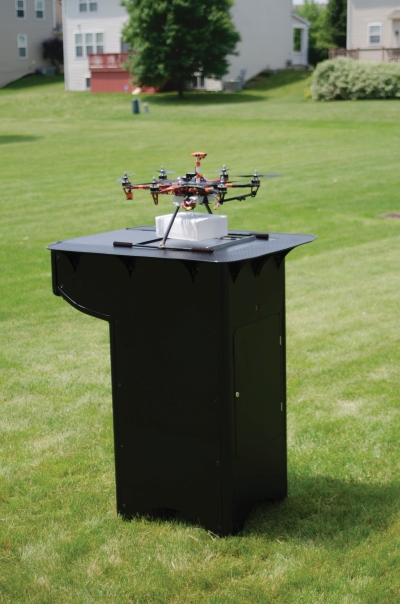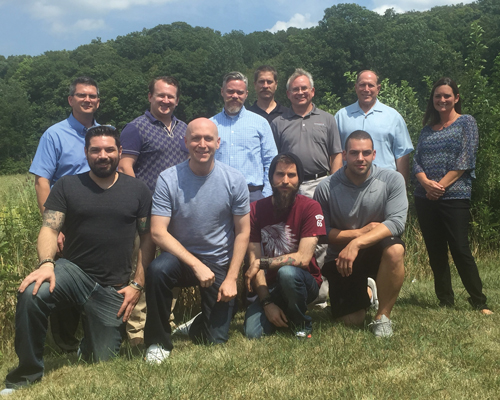
Two Illinois firms have partnered to bring a modern mailbox for the drone delivery market to life.
So much of our lives has improved thanks to recent innovations in technology. Simple, mundane devices and appliances have suddenly become “smart.” Our TVs, doorbells, thermostats and refrigerators send notifications to our smartphones and allow us to change settings from anywhere in the world. In the age of ecommerce and emerging drone delivery technology, two young inventors from Chicagoland and their startup, Valqari, decided it was time to modernize the mailbox for the 21st century. They partnered with East Peoria, Illinois’ INTEGRIS Engineering to help bring their smart drone delivery mailbox to life.
Entering the Age of Drone Delivery
Ecommerce has transformed the retail experience—in 2017, the ecommerce market totaled $2.3 trillion in sales globally. Traditional retailers have gone bankrupt at unprecedented rates as more and more consumers prefer the convenience of shopping from their computer or mobile device—especially since it is relatively affordable or even free to get quick delivery.
In 2017, Amazon shipped more than five billion packages  through its Prime service, which includes free two-day shipping (and in some cases, free one-day shipping). On the other hand, Amazon also suffered approximately $9 billion in net shipping losses last year thanks to Prime. From the fulfillment center to the doorstep, the so-called “last mile” accounts for a majority of the shipping cost. In December of 2013, Amazon released a video that revealed its drone delivery program would allow for radically affordable and quick delivery. Drone delivery would cut last-mile costs by 80 percent, making Amazon’s core business finally profitable. Ryan Walsh and Alex Falesch, business partners from Chicago’s southwest suburbs, both watched Amazon's video and saw the future marketplace unfold. “Many people thought what Amazon did was a publicity stunt, but Alex and I were convinced that this was the future,” says Walsh, a 32-year-old veteran Army Ranger and CEO of Valqari. However, they realized Amazon’s drone delivery service was missing a major component: its method of landing the drone in a customer’s yard to drop off packages presented far too many potential hazards and liabilities to be viable in heavily populated areas.
through its Prime service, which includes free two-day shipping (and in some cases, free one-day shipping). On the other hand, Amazon also suffered approximately $9 billion in net shipping losses last year thanks to Prime. From the fulfillment center to the doorstep, the so-called “last mile” accounts for a majority of the shipping cost. In December of 2013, Amazon released a video that revealed its drone delivery program would allow for radically affordable and quick delivery. Drone delivery would cut last-mile costs by 80 percent, making Amazon’s core business finally profitable. Ryan Walsh and Alex Falesch, business partners from Chicago’s southwest suburbs, both watched Amazon's video and saw the future marketplace unfold. “Many people thought what Amazon did was a publicity stunt, but Alex and I were convinced that this was the future,” says Walsh, a 32-year-old veteran Army Ranger and CEO of Valqari. However, they realized Amazon’s drone delivery service was missing a major component: its method of landing the drone in a customer’s yard to drop off packages presented far too many potential hazards and liabilities to be viable in heavily populated areas.
“Delivery drones need a standardized, safe and secure place to land,” insists Walsh. With that in mind, the two business partners spent that month writing a patent proposal for a smart drone delivery mailbox. As of June 2018, their invention has been patented in 42 countries, including China, the EU, Canada, Australia, South Africa and Canada. Walsh and Falesch had both run successful small businesses together, but they knew their latest project had the potential to be the next big thing.
Since Amazon’s unveiling, other major retailers across the globe have been quick to embrace drone delivery—with major testing happening in the U.S., China, U.K., Canada, Switzerland, Australia and New Zealand. Ecommerce giant JD.com (often referred to as “the Amazon of China”) is doing over 1,000 drone deliveries a day in mostly rural areas, with some testing in urban areas as well. Government agencies are working closely with companies like Walmart, Google, Chipotle and Domino’s to set policy. The question is not if full-scale drone delivery will take off, but when.
While these major corporations have been working on their drone programs, Walsh and Falesch kept a close eye on the developing drone delivery market. They formed Valqari in 2017, along with three other co-founders, and began seeking engineering partners to develop their modern mailbox.

The RCVR-PAD communicates wirelessly with delivery drones. Only when both devices verify each other through sophisticated encryption will the RCVR-PAD’s trap door open, allowing the delivery to be made.
Bringing the RCVR-PAD to Life
Valqari refers to their mailbox as the RCVR-PAD (pronounced “Receiver Pad”) which stands for “Remote Communicating Vault Receiver – Personal Automated Delivery.” They knew that building a mailbox this sophisticated would take a top engineering firm—one that specializes in mechanical, electrical and software system integration. They interviewed several of the best firms in Chicago, but ultimately decided to partner with East Peoria’s INTEGRIS Engineering, despite the five-hour round trip for regular meetings.
Valqari chose INTEGRIS for their versatile engineering capabilities across a wide range of industries, including aerospace, agriculture, med-tech and mining. Their ability to deliver prototypes and finished goods as an outcome of their engineering expertise was another major differentiating factor. As requested, INTEGRIS designed the device to replace traditional mailboxes. It meets U.S. postal standards, but also has the ability to securely store a majority of packages ordered by consumers online.
 The RCVR-PAD communicates wirelessly with delivery drones. Only when both the proper RCVR-PAD and delivery drone verify each other through sophisticated encryption will the RCVR-PAD’s trap door open, allowing the delivery to be made. With a device this complex, INTEGRIS employed a long list of technologies, protocols, languages and components in order to meet Valqari’s goals. To combat the growing problem of package theft from so-called “porch pirates”—a nightmare for both consumers and delivery companies—the RCVR-PAD’s vault only allows authorized users to obtain their package. Future models will feature climate control to keep food and medicine at proper temperatures.
The RCVR-PAD communicates wirelessly with delivery drones. Only when both the proper RCVR-PAD and delivery drone verify each other through sophisticated encryption will the RCVR-PAD’s trap door open, allowing the delivery to be made. With a device this complex, INTEGRIS employed a long list of technologies, protocols, languages and components in order to meet Valqari’s goals. To combat the growing problem of package theft from so-called “porch pirates”—a nightmare for both consumers and delivery companies—the RCVR-PAD’s vault only allows authorized users to obtain their package. Future models will feature climate control to keep food and medicine at proper temperatures.
Some projects start as a napkin sketch or idea without a fully developed business plan. But Valqari came to INTEGRIS with a fully fleshed-out concept and commercialization strategy—which INTEGRIS was excited to support. The project began in August of 2017 and was slated for completion with fully-operational prototypes by the end of the year. On December 23rd, successful drone deliveries to the RCVR-PAD were completed in INTEGRIS’ East Peoria shop—making it an early Christmas present.
“INTEGRIS really came through for us,” says Walsh. “It was crucial to have a working prototype moving into 2018.” A lot of doors have opened since then, as investors and strategic partners have seen their drone delivery demonstration. Valqari and INTEGRIS continue to develop and iterate the RCVR-PAD to prepare it for beta testing across the globe in early 2019. iBi
Ryan Lazarus is a cofounder and chief marketing officer of Valqari. Andrew Hoerr is a VP of sales and marketing at INTEGRIS Engineering in East Peoria, Illinois. For more information, visit valqari.com and integrisgp.com.

